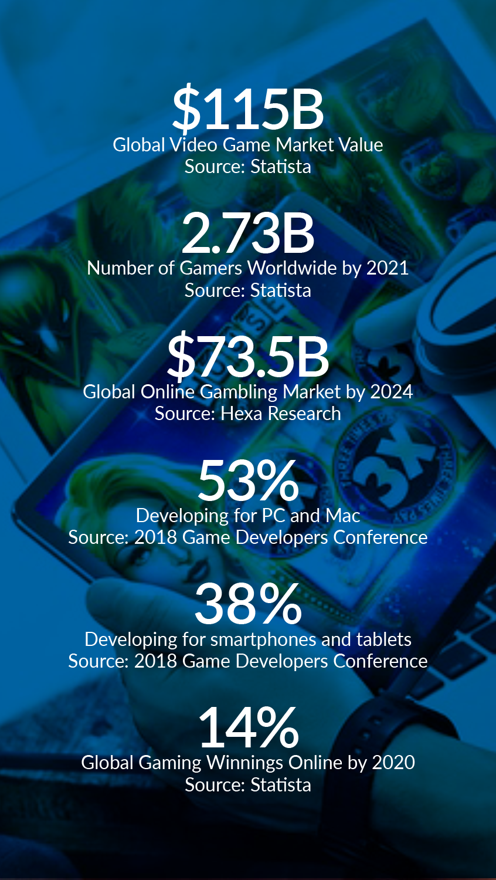Trends in Online Gaming and Gambling
Both online gaming and online gambling are rapidly changing as new technologies and providers vie to attract customers and develop brand loyalty. The proliferation of handheld devices and smartphones means that more consumers can easily access games and gambling sites, but it also means that providers must be able to scale quickly to meet such rising demand.
The global video game market is valued at more than $115 billion with the number of gamers worldwide expected to hit 2.73 billion by 2021. As that market continues to skyrocket, online gambling also is expecting robust growth because of online access through handheld devices and smart phones. Furthermore, the global online gambling market is projected to be valued at $73.45 billion by 2024.

Online gaming
According to developers at the 2018 Game Developers Conference, 53 percent of them are developing games for PC and Mac, while 38 percent are developing games for smartphones and tablets. The online gaming demographic for customers breaks down like this: 24 percent of men report playing often, followed by 19 percent of women playing often. The biggest age group who plays is those age 18-29, closely followed by those age 30-49.
One of the toughest things about this demographic may be its fickle and demanding nature that continually expects top-notch, cutting-edge games or it will quickly move on to the next big hit. “There are no more ‘B’ titles – gaming is now a world of ‘As’ and ‘Ds,” wrote Brian Nowak, a Morgan Stanley Equity Analyst.
While there has been some unease that the online gaming industry could see its first revenue decline since 1995, analysts like Nowak believe good times are ahead in 2019 as game publishers have developed bigger revenue streams through game subscriptions, in-game purchases and multiplayer services. The explosion of online games has been seen by mobile games developer like Playtika. It has more than $1.1 billion in annual revenue with 22 million monthly active users, built on the popularity of games like Slotomania and Poker Heat. Another game streamer and content platform, Curse, has more than 140 million unique daily visitors with 241 billion minutes of livestreamed gaming content.
Experts say that key growth trends include even more gamers who will spend more time playing online games – and also making online purchases through those platforms. In addition, there is expected to be an uptick in esports, which allows livestreams of gamers competing for prizes that can earn top players millions of dollars.
Online gambling
The online gambling industry is expected to shift more of its focus to virtual reality, to offer “a more dynamic and immersive way to play table games and slots,” writes Sadona Price of the Online United States Casinos. “Peer-to-peer gambling will take on a whole new format as players will be able to see each other at the tables and interact via a virtual reality experience.”
Online gambling companies also are expected to enhance the user experience with a live dealer experience, a more social aspect with poker chat rooms and more and better-quality mobile device experiences. Currently, more than half of revenue involving online gambling comes from mobile devices and it’s estimated that worldwide, online sports betting is forecast to be 14 percent of the sports betting market by 2020.
At the same time, cryptocurrency is becoming more popular as it’s seen as more secure, faster and cheaper that other payment forms. While it hasn’t replaced traditional money, it is seen as a way to attract players who want more choices when they play.
Last year the Supreme Court ruled that states have the right to legalize sports betting. However, the court did not overturn the Unlawful Internet Gambling Enforcement Act, which requires credit card companies to monitor their business so that credit or debit card payments cannot be made to online casinos. (Many credit card companies don’t allow credit card use for gambling at all.)
Another challenge facing online gambling is security. While users want a better experience, they also favor convenience and ease of use, and balk at passwords or password management. Fraud prevention will be tasked with giving users a quality, convenient experience while also trying to track fraud across several devices that might be used by a player.
“The inability to identify fraudsters sitting alongside legitimate players at a virtual poker table underscores the growing need for online casinos to deploy more effective solutions,” writes Eddie Glenn of Iovation.
Online gaming and gambling are evolving quickly, which means that providers must be able to give users a better customer experience than the competition if they want to survive. High availability, cost-effective operations, the latest technology and an ability to scale out quickly will be the hallmark of the companies that best learn to play the game.




